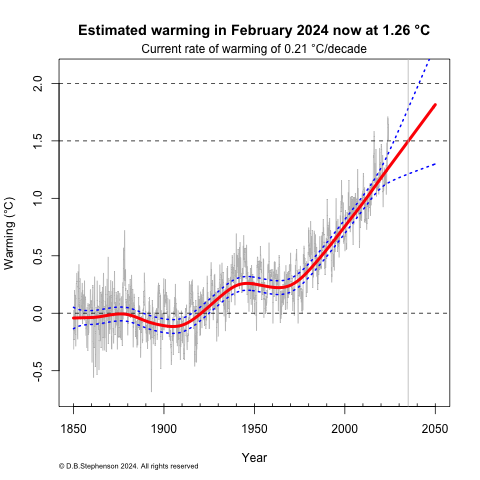Climate Change and Net Zero Task Force
The Climate Change and Net Zero Task Force was established in 2023 by RSS President Andrew Garrett to bring together collective RSS expertise on climate change and environmental issues. The Task Force is co-chaired by David Stephenson, Professor of Statistical Climatology at the University of Exeter.
There is a long history of statisticians being involved in weather and climate science – going back to figures such as Adolphe Quetelet and Jerzy Neyman – and with statistics and data science often at the forefront of climate change in terms of forecasting global average temperatures and with large datasets often involved, the RSS is well-positioned to contribute to informing discussions.
As a first project the group has begun a series of explainers to increase public understanding of the statistical aspects of climate change, starting with a focus on the 1.5°C global mean warming target.
Remit
- Engage in increasing public understanding of statistical issues linked to climate change and net zero
- Support the production and communication of evidence-based analyses
- Emphasise the importance of fundamental statistical principles and best statistical practice in relation to the analysis of related data
- Contribute to the design of future data collection
- Consider the statistics of the wider impact of climate change in areas such as health, economics and migration
- Account for differences at the individual (public), government and corporate levels as they relate to the above
- Coordinate policy responses to climate change and net zero related inquiries or calls for evidence
- Where appropriate work with adjacent organisations to fulfil the remit.
How close are we to the 1.5 ºC global warming target?
The figure below shows monthly global mean temperatures (grey line) relative to the 1850-1900 pre-industrial mean together with a carefully constructed robust trend estimate (in red). The title gives the most recent estimate of global mean warming (the rightmost point on the trend curve) and the most recent mean warming rate (the rightmost slope of the trend curve).

Updated monthly by Prof David Stephenson. See this page for details on how the plot was made.
Members
- Paul Allin – RSS Honorary Officer for National Statistics
- Peter Diggle – Distinguished Professor, Lancaster University
- Dario Domingo – RSS Young Statisticians Section and Postdoctoral Research Associate in Statistics, Durham University
- Emma Eastoe – Senior Lecturer in Statistics, Lancaster University
- Alec Erskine – Principal Consultant, Asset Management & Data Analysis, Stantec
- Andrew Garrett – RSS President (co-chair)
- Claire Miller – Professor (Statistics), University of Glasgow
- Andrew Parnell – Director of the Hamilton Institute, Maynooth University
- Amanda Penistone – Head of International Climate Finance Analysis, Department for Energy Security and Net Zero
- Adrian Raftery – Boeing International Professor of Statistics and Sociology and Adjunct Professor of Atmospheric Sciences, University of Washington
- Etienne Roesch – Professor in the School of Psychology and Clinical Language Sciences, University of Reading
- Marian Scott – Professor of Environmental Statistics, University of Glasgow
- David Stephenson – Professor of Statistical Climatology and director of the Exeter Climate Systems research centre, University of Exeter (co-chair).